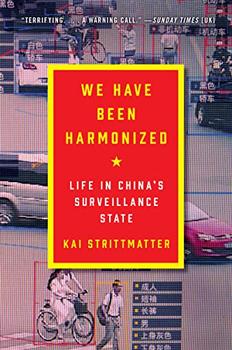Summary | Excerpt | Reviews | Beyond the book | Read-Alikes | Genres & Themes | Author Bio

Critics' Opinion:
Readers' Opinion:
First Published:
Sep 2020, 368 pages
Paperback:
Oct 2021, 320 pages
 Book Reviewed by:
Book Reviewed by:
BookBrowse Review Team
Buy This Book
Hailed as a masterwork of reporting and analysis, and based on decades of research within China, We Have Been Harmonized, by award-winning correspondent Kai Strittmatter, offers a groundbreaking look at how the internet and high tech have allowed China to create the largest and most effective surveillance state in history.
China's new drive for repression is being underpinned by unprecedented advances in technology: facial and voice recognition, GPS tracking, supercomputer databases, intercepted cell phone conversations, the monitoring of app use, and millions of high-resolution security cameras make it nearly impossible for a Chinese citizen to hide anything from authorities. Commercial transactions, including food deliveries and online purchases, are fed into vast databases, along with everything from biometric information to social media activities to methods of birth control. Cameras (so advanced that they can locate a single person within a stadium crowd of 60,000) scan for faces and walking patterns to track each individual's movement. In some schools, children's facial expressions are monitored to make sure they are paying attention at the right times. In a new Social Credit System, each citizen is given a score for good behavior; for those who rate poorly, punishments include being banned from flying or taking high-speed trains, exclusion from certain jobs, and preventing their children from attending better schools. And it gets worse: advanced surveillance has led to the imprisonment of more than a million Chinese citizens in western China alone, many held in draconian "reeducation" camps.
This digital totalitarianism has been made possible not only with the help of Chinese private tech companies, but the complicity of Western governments and corporations eager to gain access to China's huge market. And while governments debate trade wars and tariffs, the Chinese Communist Party and its local partners are aggressively stepping up their efforts to export their surveillance technology abroad—including to the United States.
We Have Been Harmonized is a terrifying portrait of life under unprecedented government surveillance—and a dire warning about what could happen anywhere under the pretense of national security.
New China, New World
A Preface
The China we once knew no longer exists. The China that was with us for forty years--the China of "reform and opening up"--is making way for something new. It's time for us to start paying attention. Something is happening in China that the world has never seen before. A new country and a new regime are being born. And it's also time for us to take a look at ourselves. Are we ready? Because one thing is becoming increasingly clear: over the coming decades, the greatest challenge for our democracies and for Europe won't be Russia, it will be China. Within its borders, China is working to create the perfect surveillance state, and its engineers of the soul are again trying to craft the "new man" of whom Lenin, Stalin, and Mao once dreamed. And this China wants to shape the rest of the world in its own image.
The Chinese Communist Party (CCP) has placed its leader, Xi Jinping, where no one has been since Mao Zedong. Right at the top. Nothing above him but ...
We Have Been Harmonized is intense. The chapters build on one another in a structured fashion, each furthering the case that the surveillance system in China is more advanced than what Orwell could have imagined. The book is systematic and comprehensive in its review, and does not come across as sensationalist or shrill. It offers up just the bare-bone facts, from a journalistic perspective. At times it reads a bit like a government white paper — emotionless. However, this gives the writing more legitimacy than many contemporary nonfiction books...continued
Full Review
(819 words)
This review is available to non-members for a limited time. For full access,
become a member today.
(Reviewed by BookBrowse Review Team).
As American political scientist Joseph Nye postulated in the 1980s, there are two ways to control people in geopolitics: hard power (i.e., coercion via violence) or soft power (i.e., enticement via incentive). Successful geopolitical strategy is often about knowing when to use soft power instead of force.
In We Have Been Harmonized, author Kai Strittmatter explains how the Chinese Communist Party has realized the potential to harness both soft and hard power to create absolute control over all aspects of its nationalized society. The Party is using information technology to enhance its security-state apparatus. Beyond camera surveillance — tracking people by gait, voice and face — and internet censorship — no images of...
This "beyond the book" feature is available to non-members for a limited time. Join today for full access.

If you liked We Have Been Harmonized, try these:

by Tania Branigan
Published 2024
An indelible exploration of the invisible scar that runs through the heart of Chinese society and the souls of its citizens.

Waiting to Be Arrested at Night
by Tahir Hamut Izgil
Published 2023
A poet's account of one of the world's most urgent humanitarian crises, and a harrowing tale of a family's escape from genocide





The Flower Sisters
by Michelle Collins Anderson
From the new Fannie Flagg of the Ozarks, a richly-woven story of family, forgiveness, and reinvention.

The House on Biscayne Bay
by Chanel Cleeton
As death stalks a gothic mansion in Miami, the lives of two women intertwine as the past and present collide.

The Funeral Cryer by Wenyan Lu
Debut novelist Wenyan Lu brings us this witty yet profound story about one woman's midlife reawakening in contemporary rural China.
Your guide toexceptional books
BookBrowse seeks out and recommends the best in contemporary fiction and nonfiction—books that not only engage and entertain but also deepen our understanding of ourselves and the world around us.